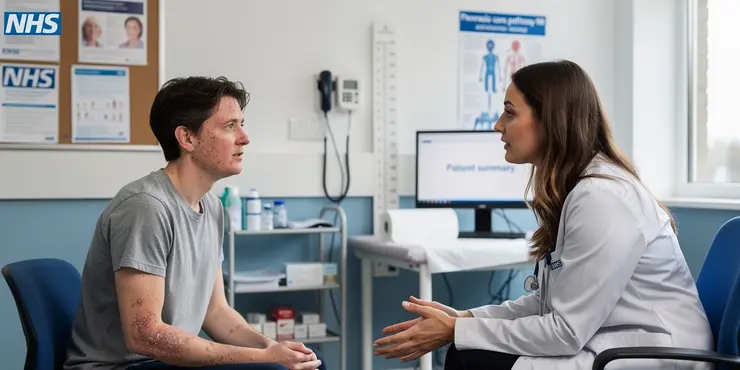
Find Help
More Items From Ergsy search
-
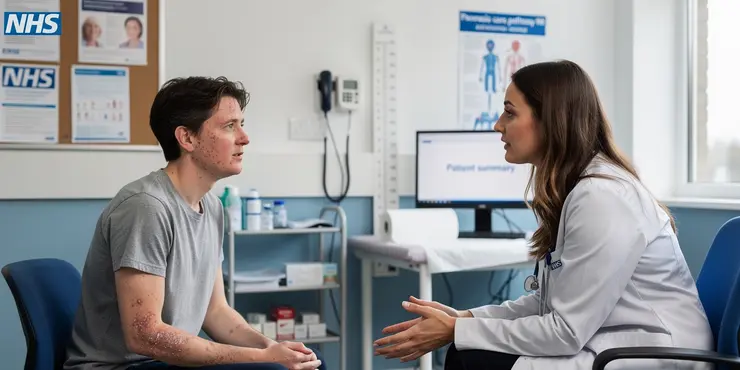
What is psoriasis?
Relevance: 100%
-
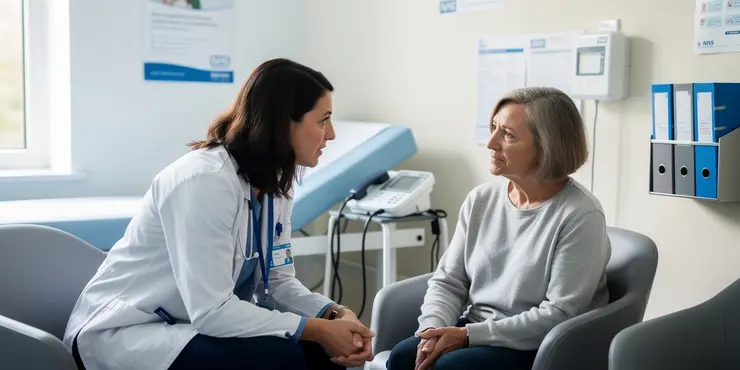
Psoriasis | NHS
Relevance: 99%
-
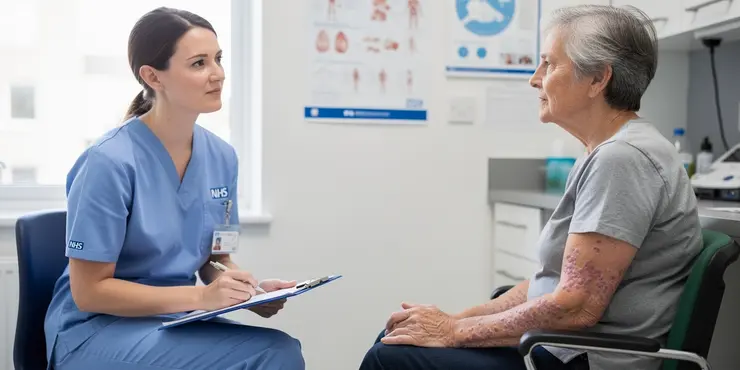
Is there a cure for psoriasis?
Relevance: 99%
-
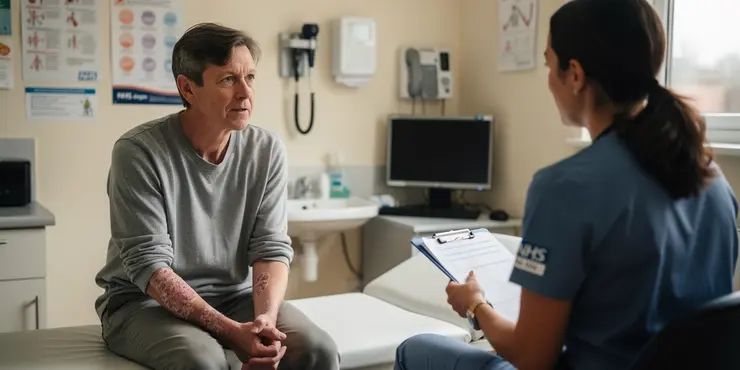
What causes psoriasis?
Relevance: 96%
-
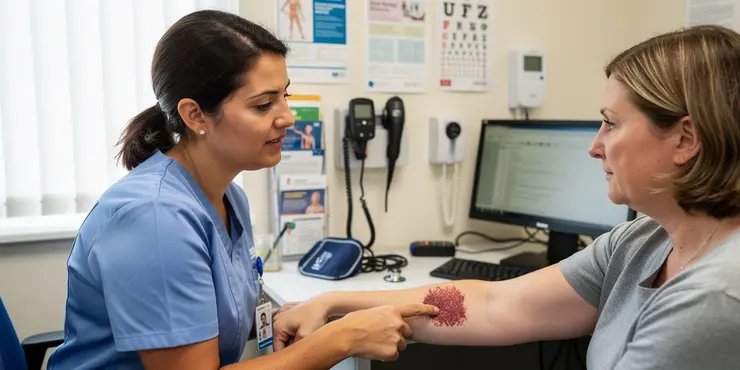
How is psoriasis diagnosed?
Relevance: 95%
-
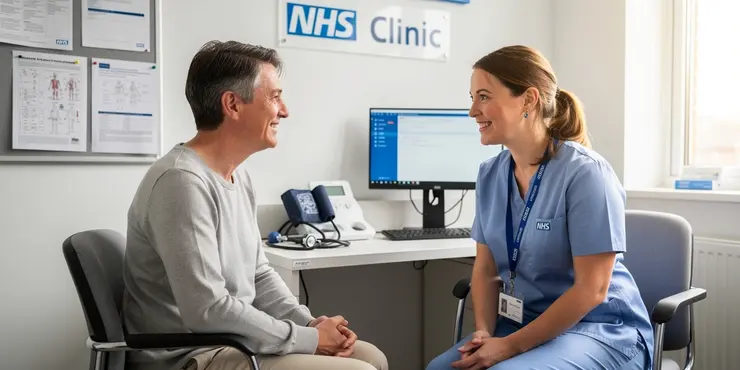
How to treat psoriasis
Relevance: 94%
-

Are there home remedies for psoriasis?
Relevance: 93%
-
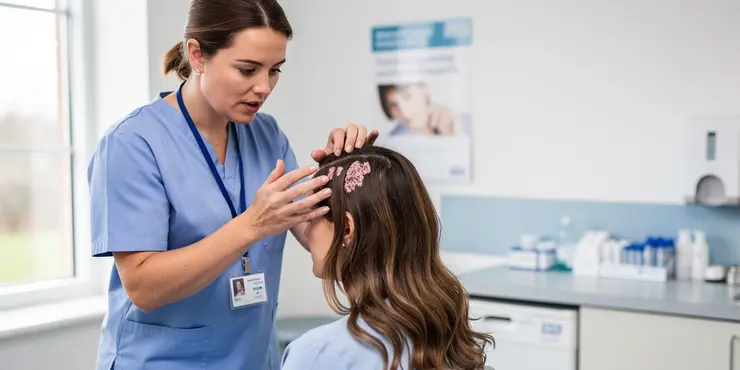
Treating scalp psoriasis
Relevance: 93%
-
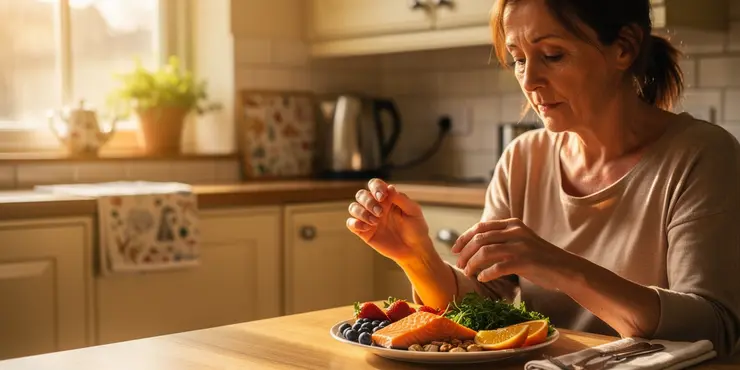
Can diet affect psoriasis?
Relevance: 92%
-
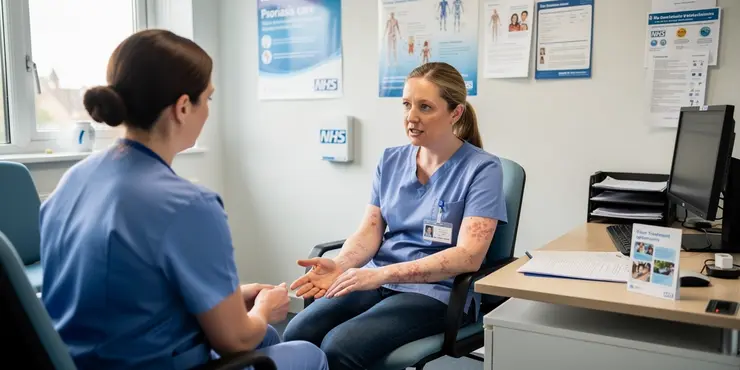
What are systemic medications for psoriasis?
Relevance: 90%
-
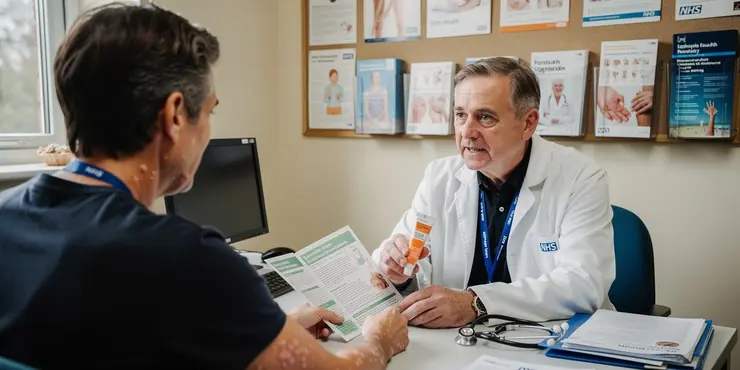
What are topical treatments for psoriasis?
Relevance: 90%
-
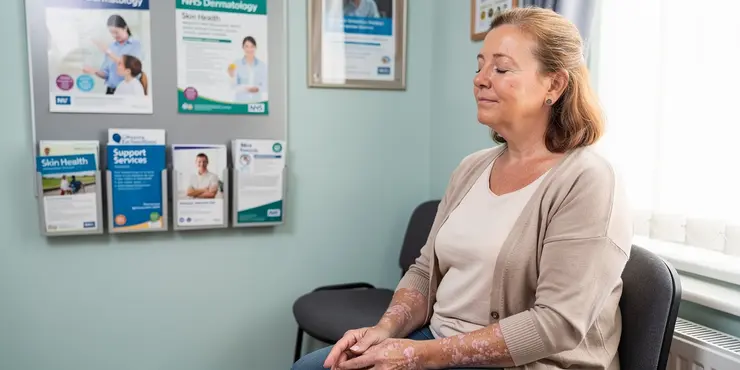
Can stress trigger psoriasis flare-ups?
Relevance: 88%
-
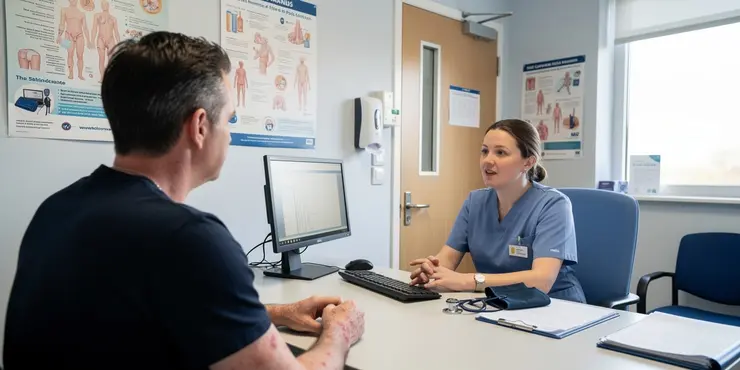
When should I see a doctor for psoriasis?
Relevance: 87%
-
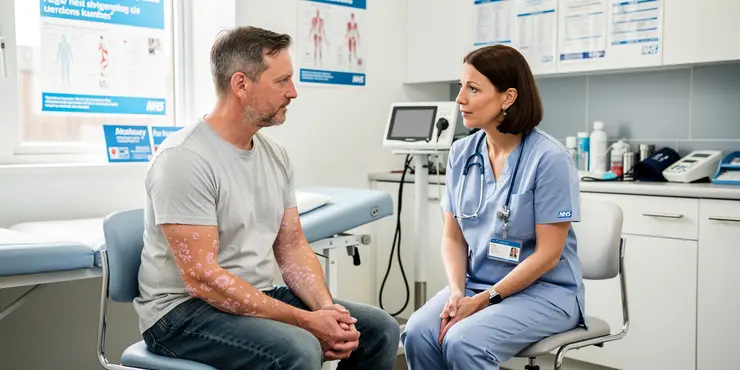
What treatment options are available for psoriasis?
Relevance: 86%
-
What role do lifestyle changes play in managing psoriasis?
Relevance: 83%
-
Is it true that sunbeds can help treat skin conditions like psoriasis?
Relevance: 76%
-
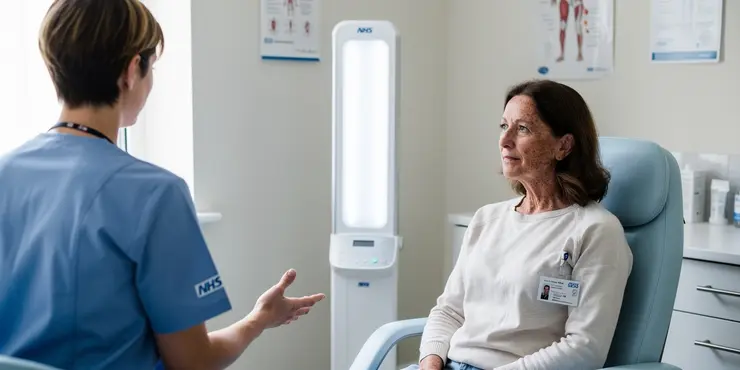
Can phototherapy help with psoriasis?
Relevance: 66%
-
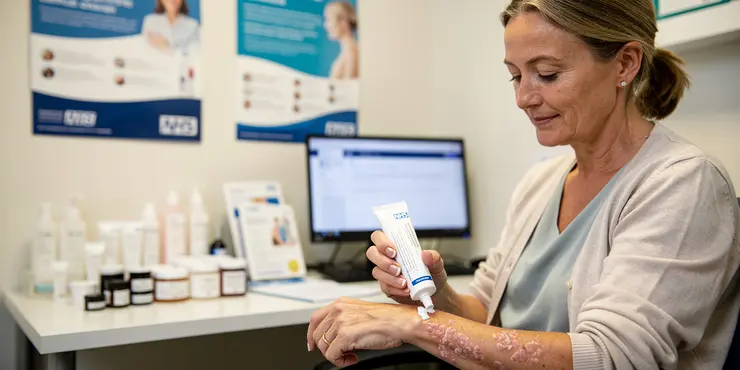
Can over-the-counter treatments help with psoriasis?
Relevance: 62%
-
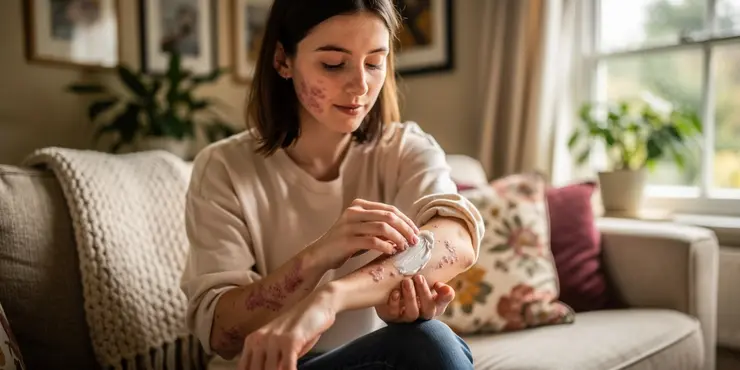
How important is it to keep the skin moisturised with psoriasis?
Relevance: 60%
-
Are there any health benefits to tanning on sunbeds?
Relevance: 21%
-
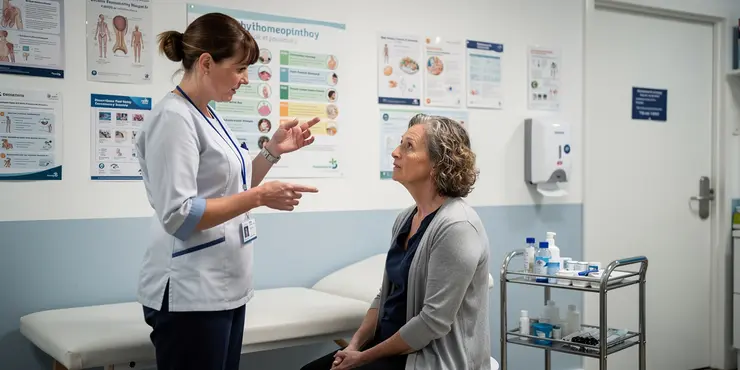
What are some common conditions treated with homeopathy?
Relevance: 20%
-
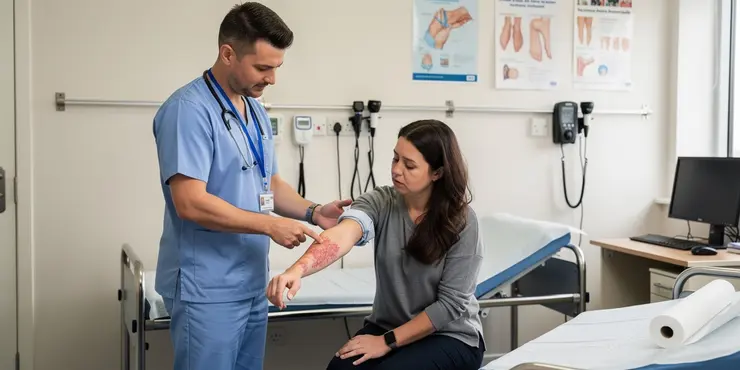
How can eczema be diagnosed?
Relevance: 19%
-
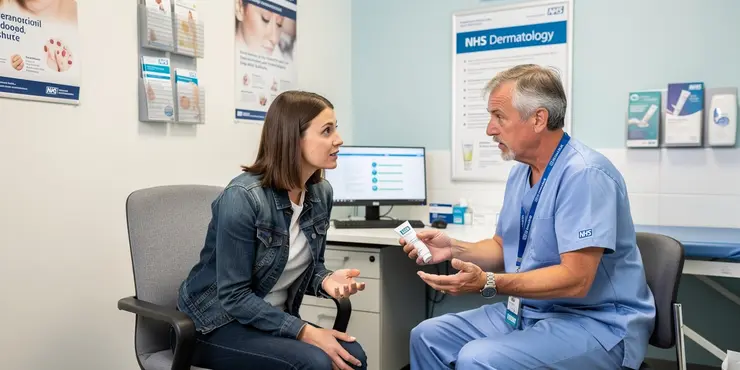
Steroid cream see Topical corticosteroids
Relevance: 19%
-
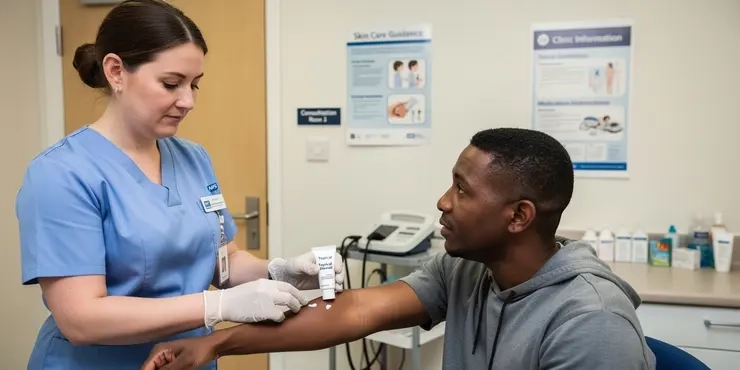
How to use topical steroids
Relevance: 18%
-
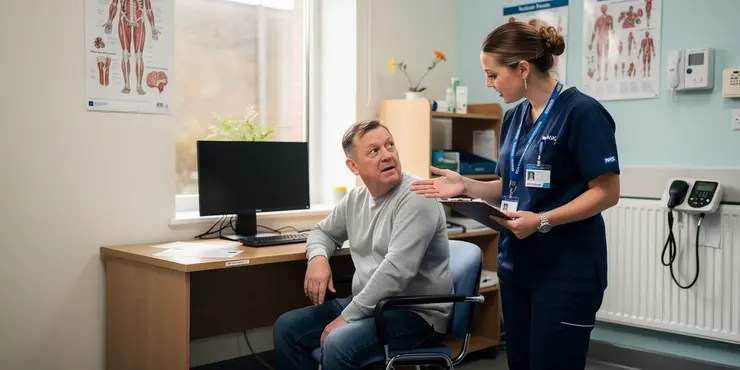
What are the potential benefits of CBD?
Relevance: 13%
-
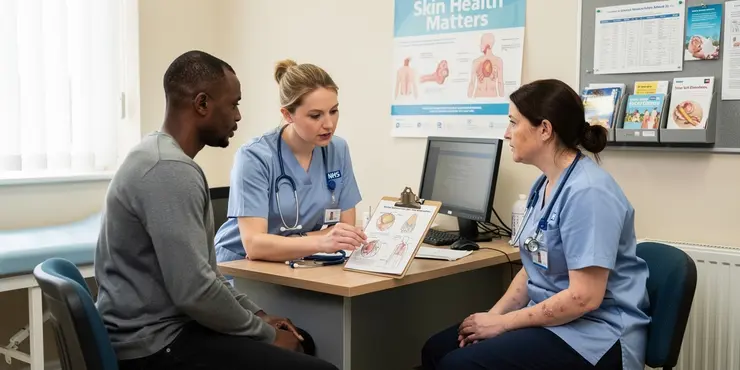
Can scabies cause complications?
Relevance: 13%
-
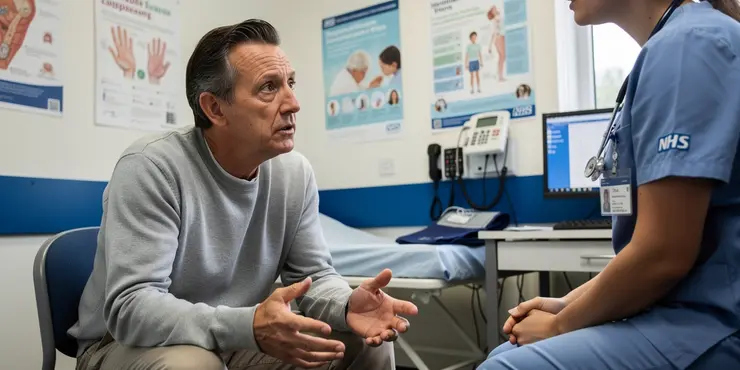
What are the uses of cannabis extract?
Relevance: 12%
-
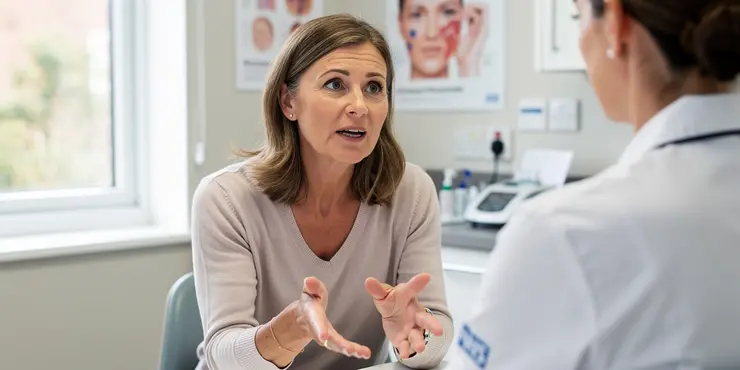
Can anyone get Botox treatments?
Relevance: 12%
-
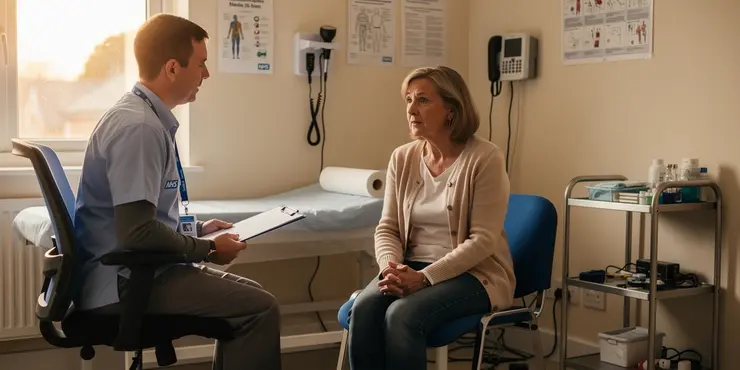
Does stress contribute to nettle rash?
Relevance: 7%
-
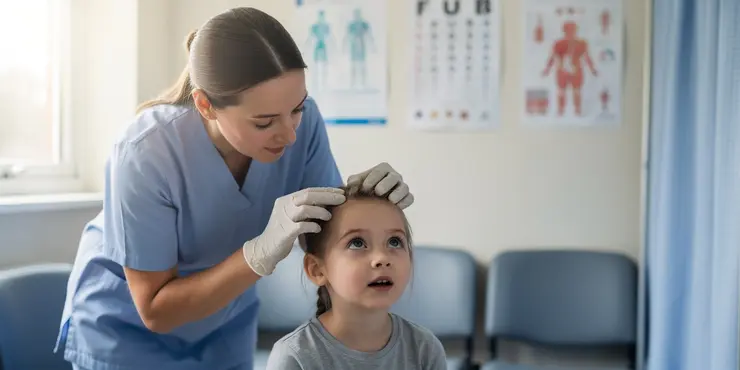
How can you differentiate nits from dandruff?
Relevance: 7%
-
Can health-related anxiety cause physical symptoms?
Relevance: 7%
-
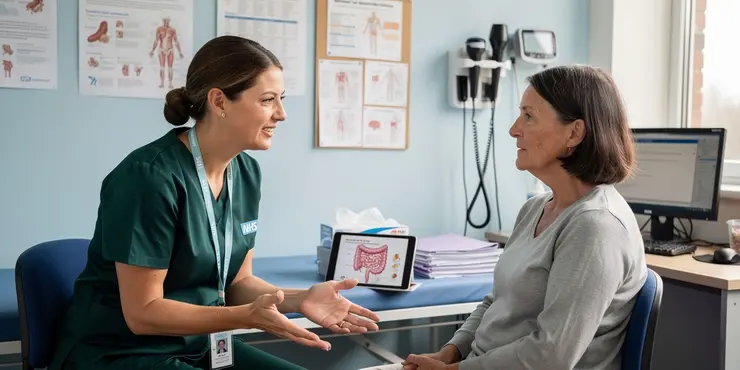
What are some signs of poor gut health?
Relevance: 6%
-
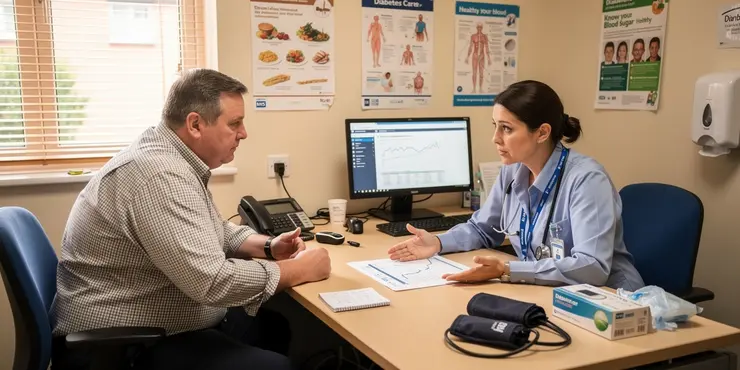
Who is at risk for flesh-eating disease?
Relevance: 6%
-
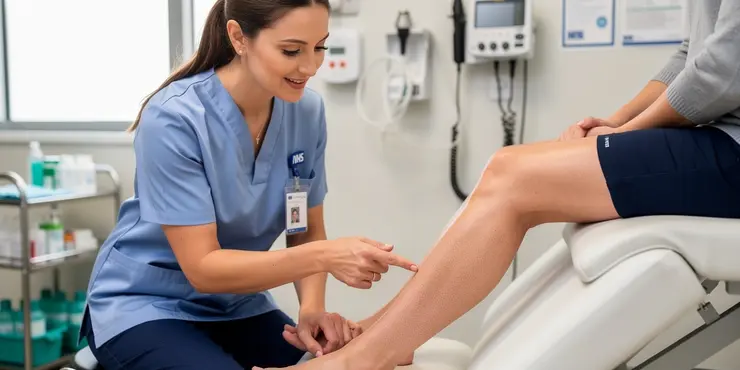
What to do about red legs
Relevance: 6%
-
Are there any health benefits to tanning on sunbeds?
Relevance: 6%
-
Can using sunbeds boost my immune system?
Relevance: 6%
-
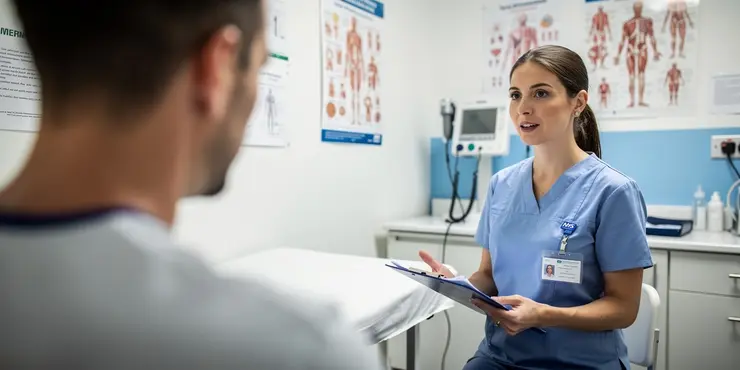
Are there health benefits to using cannabis extract?
Relevance: 6%
What is Psoriasis?
Psoriasis is a chronic skin condition that accelerates the life cycle of skin cells, causing them to build up rapidly on the surface of the skin. This results in patches of skin that are red, scaly, and often itchy or painful. Psoriasis is a long-lasting, non-contagious autoimmune disease that can vary in severity from small, localized patches to complete body coverage.
Causes of Psoriasis
Psoriasis is believed to be related to an immune system problem, with T cells accidentally attacking healthy skin cells. It may also be associated with other health conditions, such as arthritis, known in conjunction as psoriatic arthritis. While the exact cause of psoriasis isn't fully understood, certain factors can trigger it or make it worse, including infections, skin injuries, stress, smoking, prolonged sun exposure, and excessive alcohol consumption. There is also a genetic component, as psoriasis can run in families.
Symptoms and Types
The most common symptoms of psoriasis include red patches covered with silvery scales, dry and cracked skin that may bleed, itching or burning, thickened or ridged nails, and swollen or stiff joints. There are several types of psoriasis: - Plaque psoriasis, the most common type, causes dry, raised, red skin lesions. - Guttate psoriasis affects younger adults and children, usually triggered by a bacterial infection like strep throat. - Inverse psoriasis affects the skin folds in the groin, buttocks, and breasts. - Pustular psoriasis causes pus-filled blisters on the skin. - Erythrodermic psoriasis can cover the entire body with a red, peeling rash that can itch or burn intensely.
Diagnosis and Treatment
Psoriasis diagnosis typically involves a physical exam and medical history review, potentially followed by a skin biopsy to rule out other disorders. While there is currently no cure for psoriasis, treatments can help manage the symptoms. Options include topical treatments like corticosteroids, vitamin D analogues, anthralin, and topical retinoids. Phototherapy, involving controlled exposure to ultraviolet light, can also be effective. Systemic medications, either oral or injected, are prescribed for severe cases, including biologics that target specific parts of the immune system. Lifestyle changes and home remedies, such as daily baths, moisturizers, and stress management, may help reduce symptoms.
Managing Psoriasis
Managing psoriasis involves adhering to treatment plans, maintaining a healthy lifestyle, and being aware of potential trigger factors that can lead to flare-ups. Moisturizing regularly, avoiding harsh skincare products, maintaining a balanced diet, and avoiding alcohol and smoking are recommended strategies. Support groups and counselling may also be beneficial for those dealing with the psychological impacts of the condition. Regular appointments with healthcare professionals can help manage and monitor the condition effectively, improving the quality of life for those affected.
What is Psoriasis?
Psoriasis is a skin problem. It makes skin cells grow too fast. This causes red and scaly patches on the skin. The patches can be itchy or hurt. Psoriasis is not contagious, so you can't catch it from someone else. It can be mild or cover the whole body.
Causes of Psoriasis
Psoriasis happens because the body’s immune system is confused. It attacks healthy skin cells by mistake. People with psoriasis might have other health problems like joint pain. Psoriasis can run in families. Things like stress, injuries, infections, or smoking can make it worse.
Symptoms and Types
Signs of psoriasis are red patches with silver scales, itchy or burning skin, thick nails, and sore joints. There are different types of psoriasis: - Plaque psoriasis: dry, red skin. - Guttate psoriasis: often in kids after a sore throat. - Inverse psoriasis: red skin in warm areas like the groin. - Pustular psoriasis: with pus-filled bumps. - Erythrodermic psoriasis: red rash all over the body.
Diagnosis and Treatment
Doctors look at your skin and ask questions to see if you have psoriasis. Sometimes they test a small piece of skin. Psoriasis can't be cured, but treatments can help: - Creams and ointments like steroids or vitamin creams. - Light therapy, which uses UV light. - Medicines that you take as pills or injections. - Simple things like taking baths, using moisturizers, and staying calm can help too.
Managing Psoriasis
To manage psoriasis, follow your doctor’s advice and treatments. Live healthily, avoid things that make it worse like stress, smoking, and drinking alcohol. Use gentle skin products and moisturize often. Support groups and talking to counselors can help if you're feeling upset. Keep seeing your doctor to make sure everything stays under control.
Frequently Asked Questions
What is psoriasis?
Psoriasis is a chronic autoimmune skin condition that causes rapid skin cell growth, leading to scaling on the skin's surface.
What are the symptoms of psoriasis?
Symptoms include red patches of skin covered with thick, silvery scales, dry or cracked skin that may bleed, and itching or burning sensations.
What causes psoriasis?
Psoriasis is thought to be an immune system problem that causes skin cells to grow too quickly. Genetic factors and environmental triggers can also play a role.
Is psoriasis contagious?
No, psoriasis is not contagious. It cannot be passed from person to person through touch.
Can psoriasis affect other parts of the body?
Yes, psoriasis can also affect joints, leading to a condition known as psoriatic arthritis, and can impact nails, causing discoloration and abnormal growth.
How is psoriasis diagnosed?
Psoriasis is usually diagnosed through a physical exam of the skin. A dermatologist may also take a skin biopsy to rule out other disorders.
What are the common types of psoriasis?
Common types include plaque psoriasis, guttate psoriasis, inverse psoriasis, pustular psoriasis, and erythrodermic psoriasis.
What triggers psoriasis flare-ups?
Common triggers can include stress, skin injuries, infections, certain medications, and weather changes.
How is psoriasis treated?
Treatment options include topical treatments, phototherapy, systemic medications, and biologics. The choice of treatment depends on the severity and type of psoriasis.
Can lifestyle changes help manage psoriasis?
Yes, lifestyle changes such as maintaining a healthy diet, managing stress, avoiding skin injuries, and moisturizing regularly can help manage symptoms.
Is there a cure for psoriasis?
Currently, there is no cure for psoriasis, but treatments can help control symptoms and improve quality of life.
Can psoriasis affect mental health?
Yes, psoriasis can have a significant impact on mental health, leading to depression, anxiety, and reduced self-esteem.
Are there any natural remedies for psoriasis?
Some people find relief through natural remedies such as aloe vera, oatmeal baths, and fish oil supplements, but effectiveness varies from person to person.
Does diet affect psoriasis?
While no specific diet can cure psoriasis, some people find that reducing alcohol, red meat, and high-fat foods can help manage flare-ups.
How does psoriasis differ from eczema?
Psoriasis and eczema are both chronic skin conditions, but they have different triggers, symptoms, and treatments. Psoriasis tends to have more defined and scaly red patches.
Can children get psoriasis?
Yes, psoriasis can affect children, though it is more commonly diagnosed in adults. Symptoms and treatments are similar across age groups.
What is scalp psoriasis?
Scalp psoriasis is a form of psoriasis that occurs on the scalp, causing red, itchy areas with silvery-white scales.
Can psoriasis change over time?
Yes, the severity and location of psoriasis can change over time, with periods of remission and flare-ups.
What is the impact of weather on psoriasis?
Cold, dry weather can worsen symptoms, while moderate sunlight exposure may improve them. However, too much sun can trigger flare-ups.
Can psoriasis lead to other health complications?
Yes, individuals with psoriasis are at higher risk of developing conditions like psoriatic arthritis, cardiovascular disease, and metabolic syndrome.
What is psoriasis?
Psoriasis is a skin problem. It makes your skin red and itchy. The skin might have silver scales. It can happen on your arms, legs, face, or anywhere.
Psoriasis is not catchy. This means you cannot give it to anyone else.
If you have psoriasis, it can help to talk to a doctor. They can give you creams or other help.
Try to keep your skin soft. Use lotion to stop it from getting dry.
Psoriasis is a long-lasting skin problem. It makes your skin cells grow too fast. This causes patches on your skin.
What happens when you have psoriasis?
You might see red spots on your skin. They could have thick, shiny silver stuff on them. Your skin might feel very dry or have cracks that bleed. It might itch or feel like it's burning.
Some things that could help are:
- Use gentle skin creams to keep your skin soft
- Wear soft clothing without scratchy tags
- Take warm baths with gentle soap
- Talk to a grown-up or doctor if you feel worried
What makes psoriasis happen?
Psoriasis is a skin problem. It makes your skin red and flaky. We don't know exactly why it happens, but some things can make it worse:
- When your body's defense system (immune system) works too much.
- If your family members have it, you might have it too.
- Stress or feeling very worried can make it start or get worse.
- Getting sick, like with a cold, can also make it worse.
- Some medicines can make it worse too.
Helpful tools can be:
- Talk to a doctor: They know a lot and can help you.
- Support groups: Meet people who understand what you're going through.
- Healthy habits: Eat well and try to stress less.
Psoriasis is a problem with the body’s defense system. It makes skin cells grow too fast. Genes and things around you can also cause it.
Can you catch psoriasis from someone else?
No, you cannot catch psoriasis from another person. It is not spread like a cold or the flu.
Psoriasis happens because of the way your body works inside. It is not caused by germs you can catch.
To learn more, you can ask a doctor or use easy-to-read websites that talk about skin health.
No, you cannot catch psoriasis from someone else. Touching someone with psoriasis will not make you get it.
Can psoriasis affect other parts of the body?
Psoriasis is a skin problem. It can make your skin red and itchy. But psoriasis can also affect other parts of your body. It might hurt your joints and make them stiff. This is called psoriatic arthritis.
If you have psoriasis, it's important to see a doctor. They can help you manage it. You can also use cream on your skin to feel better. Talking to someone about how you feel can also help.
Yes, psoriasis can also hurt the joints. This is called psoriatic arthritis. Psoriasis can also change how nails look. Nails might get different colors and grow in a strange way.
How do doctors find out if you have psoriasis?
Doctors find out if you have psoriasis by looking at your skin. Sometimes, a skin doctor, called a dermatologist, might take a tiny piece of skin to check for other problems.
What are the main types of psoriasis?
Psoriasis is a skin problem. There are different kinds. Here are some common ones:
- Plaque psoriasis: Red, bumpy skin covered with white scales.
- Guttate psoriasis: Small, red spots on the skin.
- Inverse psoriasis: Red, shiny skin in folds like the armpits.
- Pustular psoriasis: White, pus-filled bumps on the skin.
- Erythrodermic psoriasis: Skin looks very red and peels like a sunburn.
For help, you can ask a doctor or use apps with picture guides.
There are different kinds of psoriasis. They have different names:
- Plaque psoriasis
- Guttate psoriasis
- Inverse psoriasis
- Pustular psoriasis
- Erythrodermic psoriasis
If you need help reading, try using tools that read text out loud. They can be very helpful!
What makes psoriasis get worse?
Psoriasis can sometimes get worse. Here are some things that can make it happen:
- Feeling very worried or stressed
- Getting a cold or another illness
- Some skin injuries like cuts or sunburn
- Cold, dry weather
- Some medicines
If you are not sure what is making your psoriasis worse, talk to a doctor. Keeping a diary of when your skin gets worse can also help you find out what triggers it.
Things that can make it worse are stress, hurting your skin, getting sick, some medicines, and changes in the weather.
How do you treat psoriasis?
Psoriasis is a skin problem. It makes your skin red, itchy, and sometimes scaly.
Here are some simple ways to help treat psoriasis:
- Use cream or ointment: Put special cream on your skin. This can help stop itching and reduce redness.
- Take medicine: Sometimes, doctors give pills or syrups to help from the inside.
- Light therapy: A doctor might use a special light to help your skin get better.
- Stay healthy: Eat good food, drink lots of water, and try to relax. This can make your skin happier.
Always talk to a doctor before trying anything new. They know how to help your skin the best.
There are different ways to help with psoriasis. These include putting medicine on your skin, using special light, taking strong medicine, or using special new treatments called biologics. Doctors decide the best way depending on how bad your psoriasis is and what kind you have.
Can changing how you live help with psoriasis?
Yes, you can feel better by making some changes in your life. Eat healthy food, try to stay calm, be careful not to hurt your skin, and use lotion to keep your skin soft.
Can people get better from psoriasis?
Psoriasis is a skin problem. People with psoriasis have red, itchy patches on their skin.
There is no cure for psoriasis, but doctors can help make the skin better. They have special creams and medicines.
If you have psoriasis, it's good to talk to a doctor. They know how to help.
Simple things like gentle skin care, eating healthy food, and staying stress-free can also help with psoriasis.
To learn more, you can watch videos online or ask someone you trust to explain it to you.
Right now, there is no way to completely get rid of psoriasis. But there are medicines that can help make the symptoms better and help people feel better in their everyday life.
Does psoriasis affect how we feel?
Psoriasis is a skin condition. It can make you feel itchy and sore.
Sometimes, psoriasis can also make you feel sad or worried. This is okay, and many people feel this way.
If you feel sad or worried, talk to someone you trust or a doctor. They can help you feel better.
You can also try relaxing activities. Maybe draw, read, or listen to music. These can help you feel calm.
Yes, psoriasis can make people feel bad. It can cause sadness, worry, and make people like themselves less.
Can nature help with psoriasis?
Psoriasis is a skin problem that causes red, itchy patches. There are some natural ways that might help:
- Aloe Vera: This plant can be put on the skin to help with itching and redness.
- Oatmeal Baths: Soaking in water with oatmeal can make your skin feel better.
- Healthy Diet: Eating lots of fruits and vegetables can be good for your skin.
- Fish Oil: Some people find that taking fish oil helps their skin.
Ask a grown-up or a doctor before trying something new.
Some people feel better by using natural things like aloe vera, oatmeal baths, and fish oil supplements. These may help some people, but they don't work for everyone.
Can what you eat make psoriasis better or worse?
There is no special food plan that can make psoriasis go away. But some people feel better when they eat less alcohol, red meat, and fatty foods.
How is psoriasis different from eczema?
Psoriasis and eczema are both skin problems. They can look the same, but they are not. Here is how they are different:
Psoriasis
- Skin gets thick and red with white or silver scales.
- It can hurt and feel sore.
- Psoriasis lasts a long time and can come back.
Eczema
- Skin gets red, dry, and itchy.
- It can be very itchy and make you want to scratch.
- Eczema can get better with care and might go away.
If you find it hard to read, you can use:
- Text-to-speech tools to listen to the words.
- Highlighting tools to keep your place.
Psoriasis and eczema are both skin problems that last a long time. But they start, look, and get better in different ways. Psoriasis shows up as red spots with clear edges and scaly skin.
Can kids have psoriasis?
Yes, kids can have psoriasis. It's a skin problem that can cause redness, itchiness, and patches on the skin. If you think your child has psoriasis, it's important to talk to a doctor. The doctor can help figure out what it is and how to make it better.
Here are some things that might help:
- Use gentle soaps and moisturizers.
- Avoid scratching or rubbing the skin.
- Follow the doctor's advice and use any recommended creams or treatments.
Yes, kids can get psoriasis too, but it's more common in grown-ups. The signs and treatments are similar for kids and adults.
What is scalp psoriasis?
Scalp psoriasis is when your skin on your head gets red and flaky. It can be itchy. It’s not catching, so you won’t give it to anyone else.
Here are some things that can help you:
- See a doctor: They can give you special creams or shampoos.
- Brush gently: Use a soft brush for your hair.
- Use cool water: Wash your hair with cool or warm water, not hot.
Scalp psoriasis is a skin problem that happens on your head. It makes red and itchy spots with white flakes.
Can psoriasis change over time?
Psoriasis is a skin condition. It can look different as time goes by. Sometimes it might get better, and other times it might get worse.
If you have psoriasis, it is good to see a doctor. They can help you understand it better.
Tools like drawing pictures or using simple words can help explain psoriasis. You can also ask someone to read with you.
Sometimes, psoriasis can get better or worse. It can also move to different parts of the body. You might have times when it's not so bad and times when it gets worse.
It can help to use things like:
- Moisturizing creams to soothe your skin.
- Medicines from your doctor.
- Relaxation techniques like deep breathing to reduce stress.
How does the weather affect psoriasis?
Cold and dry weather can make skin feel worse. A little bit of sunshine can help your skin feel better. But too much sun can make your skin hurt again.
Can psoriasis cause other health problems?
Psoriasis is a skin condition. It can make your skin red, itchy, and scaly.
Sometimes, psoriasis can cause other health problems.
Tell your doctor if you feel any new symptoms. Your doctor can help you stay healthy.
Using tools like picture guides or videos can help you understand more.
Yes, people with psoriasis can get other health problems. These include joint problems, heart disease, and issues with body weight and sugar.
Useful Links
This website offers general information and is not a substitute for professional advice.
Always seek guidance from qualified professionals.
If you have any medical concerns or need urgent help, contact a healthcare professional or emergency services immediately.
Some of this content was generated with AI assistance. We’ve done our best to keep it accurate, helpful, and human-friendly.
- Ergsy carfully checks the information in the videos we provide here.
- Videos shown by Youtube after a video has completed, have NOT been reviewed by ERGSY.
- To view, click the arrow in centre of video.
- Most of the videos you find here will have subtitles and/or closed captions available.
- You may need to turn these on, and choose your preferred language.
- Go to the video you'd like to watch.
- If closed captions (CC) are available, settings will be visible on the bottom right of the video player.
- To turn on Captions, click settings .
- To turn off Captions, click settings again.
More Items From Ergsy search
-

What is psoriasis?
Relevance: 100%
-

Psoriasis | NHS
Relevance: 99%
-

Is there a cure for psoriasis?
Relevance: 99%
-

What causes psoriasis?
Relevance: 96%
-

How is psoriasis diagnosed?
Relevance: 95%
-

How to treat psoriasis
Relevance: 94%
-

Are there home remedies for psoriasis?
Relevance: 93%
-

Treating scalp psoriasis
Relevance: 93%
-

Can diet affect psoriasis?
Relevance: 92%
-

What are systemic medications for psoriasis?
Relevance: 90%
-

What are topical treatments for psoriasis?
Relevance: 90%
-

Can stress trigger psoriasis flare-ups?
Relevance: 88%
-

When should I see a doctor for psoriasis?
Relevance: 87%
-

What treatment options are available for psoriasis?
Relevance: 86%
-
What role do lifestyle changes play in managing psoriasis?
Relevance: 83%
-
Is it true that sunbeds can help treat skin conditions like psoriasis?
Relevance: 76%
-

Can phototherapy help with psoriasis?
Relevance: 66%
-

Can over-the-counter treatments help with psoriasis?
Relevance: 62%
-

How important is it to keep the skin moisturised with psoriasis?
Relevance: 60%
-
Are there any health benefits to tanning on sunbeds?
Relevance: 21%
-

What are some common conditions treated with homeopathy?
Relevance: 20%
-

How can eczema be diagnosed?
Relevance: 19%
-

Steroid cream see Topical corticosteroids
Relevance: 19%
-

How to use topical steroids
Relevance: 18%
-

What are the potential benefits of CBD?
Relevance: 13%
-

Can scabies cause complications?
Relevance: 13%
-

What are the uses of cannabis extract?
Relevance: 12%
-

Can anyone get Botox treatments?
Relevance: 12%
-

Does stress contribute to nettle rash?
Relevance: 7%
-

How can you differentiate nits from dandruff?
Relevance: 7%
-
Can health-related anxiety cause physical symptoms?
Relevance: 7%
-

What are some signs of poor gut health?
Relevance: 6%
-

Who is at risk for flesh-eating disease?
Relevance: 6%
-

What to do about red legs
Relevance: 6%
-
Are there any health benefits to tanning on sunbeds?
Relevance: 6%
-
Can using sunbeds boost my immune system?
Relevance: 6%
-

Are there health benefits to using cannabis extract?
Relevance: 6%


